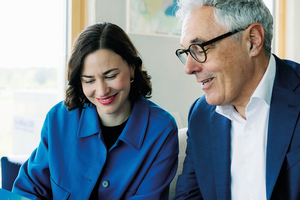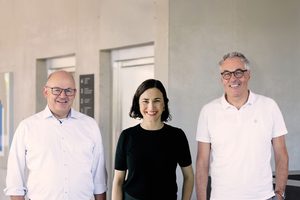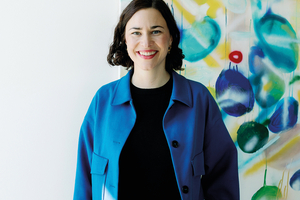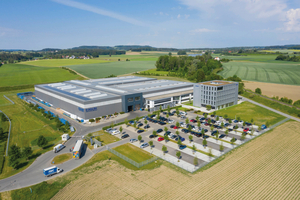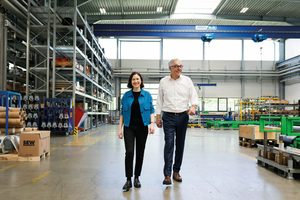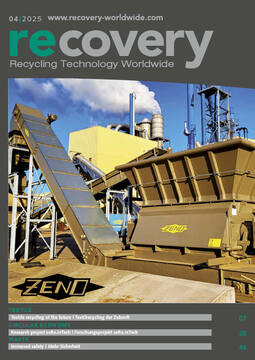STADLER appoints eighth-Generation family member
Julia Stadler as Co-Chief Executive Officer
STADLER Anlagenbau GmbH, one of the globally active German companies specializing in the planning, production, and assembly of turnkey recycling and sorting plants, announced the appointment of Julia Stadler as Co-Chief Executive Officer, effective June 1, 2025. This step reinforces STADLER’s long-standing tradition of family leadership and embraces a forward-looking, sustainability-driven ap-proach.
The leadership team now consists of two Co-CEOs, Willi and Julia Stadler, and CFO Claus Maier. This strong, collaborative team combines experience, innovation, and generational transition, ensuring continuity, trust, and a unified strategic vision rooted in environmental responsibility and engineering excellence.
Founded in 1791 as a village forge in Altshausen, STADLER has evolved over eight generations into an internationally recognized technology leader. Today, the company is synonymous with high-quality, tailor-made sorting systems for various types of waste, enabling efficient preparation for recycling. With its innovative solutions, STADLER plays a crucial role in advancing a healthy circular economy in every country it serves.
When Willi Stadler assumed leadership in 1993, the company employed just 26 people. Today, that number has grown to around 600 – reflecting sustained growth driven by a steadfast commitment to quality and innovation.
Julia Stadler, the eighth-generation family member, joined STADLER in 2023 and has served as Chief Digital Officer for the past two years. In this role, she has led the company’s digital transformation, driving initiatives in automation, integrated data systems, and AI, positioning STADLER for long-term global competitiveness. Her leadership in this role, combined with her prior international consulting experience, has equipped her with sharp strategic insight, authentic leadership qualities, and a deep understanding of global business dynamics, making her exceptionally well-prepared to assume the role of Co-CEO.
“Stepping into the role of Co-CEO as the eighth generation in our family business comes with many emotions: pride, humility, and gratitude,” says Julia Stadler. “It’s both a commitment to carry forward a business built over more than 230 years and a unique opportunity to shape where we’re going. Most of all, it’s a privilege to do this alongside my father and our dedicated team.”
Julias‘s leadership qualities are powerfully captured in the words of Willi Stadler: “Julia is extremely goal-oriented and driven. When she sets a vision, she pursues it with focus, energy, and persistence. At the same time, she leads with empathy and integrity – essential qualities in today’s leadership. She listens carefully, brings people together, and creates an environment where innovation and responsibility can grow. These qualities make her not only a strong leader but also an inspiring one.” Guided by core values such as responsibility and optimism, Julia fosters a culture of ownership and empowerment, encouraging individuals and teams to view challenges not as obstacles, but as opportunities for innovative solutions.
“Julia’s appointment represents continuity and long-term thinking for our company. Her energy, modern leadership style, and international perspective bring great potential for the future. With her on the leadership team, we are well positioned to grow further and shape the next chapter of our company’s success. Lastly, I just want to say that I couldn’t imagine a better Co-CEO to work with,” concludes Willi Stadler.
Ulrike Mehl, editor of recovery – Recycling Technology Worldwide, took the opportunity to speak with Julia Stadler, the newly appointed Co-CEO of STADLER Anlagenbau GmbH.
You have been working in your family business since 2023. What goals had you set yourself for this new career step?
Julia Stadler: Before 2023, I worked in management consulting, where I led and delivered numerous strategic projects, many of which focused on digitalisation. The practical experience I gained during this time was good preparation for taking on the newly created position of Chief Digital Officer when I joined our family business and for building up the digital division. I had previously developed a digital strategy with the aim of working with colleagues to develop digital solutions that create real added value for our customers as integrated data systems in our sorting plants. And, of course, I also want to open up new growth opportunities for our company and expand our market and technology leadership.
As Chief Digital Officer, you were previously responsible for the company’s digital transformation, primarily driving forward the areas of automation, integrated data systems and AI. Will there be any changes to these areas of responsibility, or will there be added new responsibilities?
Julia Stadler: I will continue to be responsible for the Digital Solutions division. But of course new areas of responsibility will be added. These include Human Resources, After Sales, i. e. customer support and all tasks related to maintenance and service, as well as process management, IT, marketing and communication.
I will therefore be involved in many strategic areas relevant to the company and want to learn as much as possible from my father, but also from the entire team. Ultimately, it‘s about putting the needs and problems of customers at the forefront in order to build and continue long-term relationships with satisfied customers.
To what extent and for which working steps is AI already being used in your plants?
Julia Stadler: With STADLERconnect, we have developed an overarching digital platform that combines various digital solutions in the form of individual modules, which in turn can be customised to the various sorting systems. There are modules for digital maintenance, for automation and for material analysis.
Predictive maintenance is one of the modules, in which the condition of the systems is permanently monitored using sensor measurement data. This means that any critical change in the process sequence is immediately registered and communicated even before a potential problem arises that could lead to the system coming to a standstill. If a drop in performance becomes noticeable, early inspections can minimise the risk of production downtime or prevent it altogether. As an early warning system, this permanent condition monitoring of the systems also enables predictive planning of maintenance work.
With the Blockage Detection Module, blockages can be detected at an early stage, which can then be rectified in good time before the system comes to a standstill. We monitor the machine parameters almost in real time and use a machine learning model that analyses all changes, problems or downtimes of the system, including the causes – all with the aim of ensuring a smooth material flow, improving the performance of the sorting systems and avoiding downtimes.
For the area of material analysis, we have developed the BaleCheckIn in conjunction with infrared technology, which recognises the exact composition of each individual bale of material delivered. Right at the start of the sorting process, for example, we also know which impurities are contained in the material flow, and at the end of the sorting process the BaleCheckOut can also be used to analyse the material output. We therefore receive precise information about the material quality and the overall costs for manual sampling and analysis can be reduced.
What are the benefits of STADLER‘s AI solutions for your customers?
Julia Stadler: We have already installed our digital solutions in 25 plants over the last 2 years and have had good experiences overall, particularly in terms of the added value that this brings for our customers. Customers benefit from improved operational planning, plant availability and operational efficiency, as there is less downtime and operating costs can be reduced as a result. The digital solutions support operational staff, ensure optimum product quality, better planning of maintenance work and unforeseen problems can be resolved more quickly.
Can systems that have been in place for a long time be retrofitted?
Julia Stadler: Yes, this is generally possible, and we have already realised such retrofitting on many occasions. Of course, certain requirements must be met for the individual modules: for example, if additional hardware is installed, the space for it must also be available.
Will the use of AI also have an impact on the structure of your company? If so, to what extent?
Julia Stadler: Yes, the use of AI is not only changing our products, but also the areas of work in our company. We now employ software developers specialising in AI and we are also investing in special training for our employees so that they can use AI in areas where it makes sense and understand how to create added value in their day-to-day work with the help of AI. This also results in an upgrading of individual positions within the company. Routine work processes can be carried out faster and in a more data-based way, which also makes the company more attractive as an employer.
How do you see the future development of your family business
Julia Stadler: I am convinced that there is great potential for growth in the recycling industry – including for our family business. Significantly more sorting systems are needed around the world for a wide range of material streams, from plastic bottles, film and lightweight packaging to paper and cardboard, household and commercial waste, textiles and electronic waste. We manufacture sorting and recycling systems for all these materials.
Is there anything you would like to see politicians do in order to achieve a closed circular economy?
Julia Stadler: Efforts at EU level are definitely going in the right direction – for example, the new EU Packaging Regulation (PPWR), which came into force in February with the aim of making all packaging reusable or recyclable by 2030.
However, global requirements for extended producer responsibility and further legal regulations for mandatory recycling percentages in the various products would be important. Manufacturers should develop more sustainable and recyclable products and should thus be made responsible for taking back, disposing of or reprocessing their products. This would also make them responsible for the end-of-life phase and therefore for the entire life cycle of packaging. However, it would then be essential to check compliance with these requirements in practice.
This is the only way to move closer to a truly closed circular economy. Unfortunately, we are still some way off this.
STADLER is active globally. Are there countries in which your company is not yet represented? Do you see further potential here?
Julia Stadler: Yes, our waste sorting systems are installed in over 50 countries. But there are also countries, particularly on the African continent, where we are not yet so strongly represented. We see further potential there, but also in Asia, which we want to tackle in the future.
The increasing shortage of skilled labour or well-trained skilled workers is a recurring topic in the media. Is this issue also a challenge for your company? What possibilities do you see to counteract this?
Julia Stadler: The shortage of skilled labour is also an important issue for us, as we would like to have more applicants, especially in the area of training. That is why our company took action several years ago. To attract potential trainees, we have been organising a Night of Training every year since 2018, for example. Young people can find out about the wide range of training opportunities at STADLER at information stands – e. g. in the areas of metal construction, mechatronics, warehouse logistics, precision mechanics and product design - and gain an insight into the various areas of work through guided tours of the company.
Since 2023, we have also been organising an annual summer school for students together with several partners in our technical centre at our Slovenian test and innovation centre in Krško. Here, we offer around 15 selected students from various European universities the opportunity to spend a week operating the plastics sorting test facility and immerse themselves in real-life practice within our industry. In other words, the students are given the opportunity to set up and operate a complete process chain for converting feed material into the corresponding product fractions on their own. This is also a successful event, which has received very positive feedback and which we will definitely continue to offer.
What fascinates you about your job?
Julia Stadler: What fascinates me the most are the diverse and varied tasks that we are confronted with as plant manufacturers in the recycling industry, which offer us the opportunity to develop state-of-the-art products with tangible benefits for our customers. Ultimately, these products also benefit society as a whole.
I am also enthusiastic about being close to people, especially our employees, with whom we develop solutions together and thus make a difference.
What would you consider to be your best personal preconditions for your new position?
Julia Stadler: I would say that I am primarily driven by optimism. Because as an entrepreneur, you need to have a positive vision of the future.

